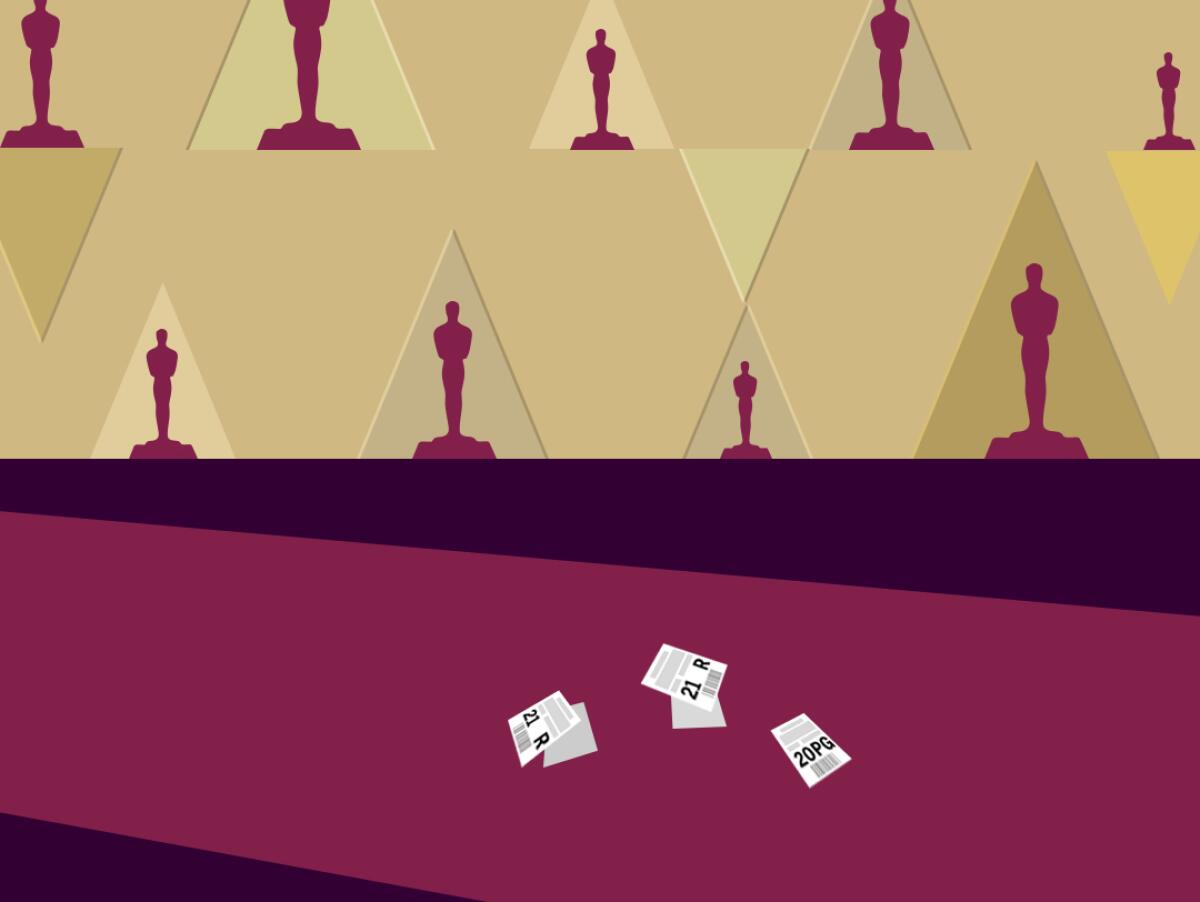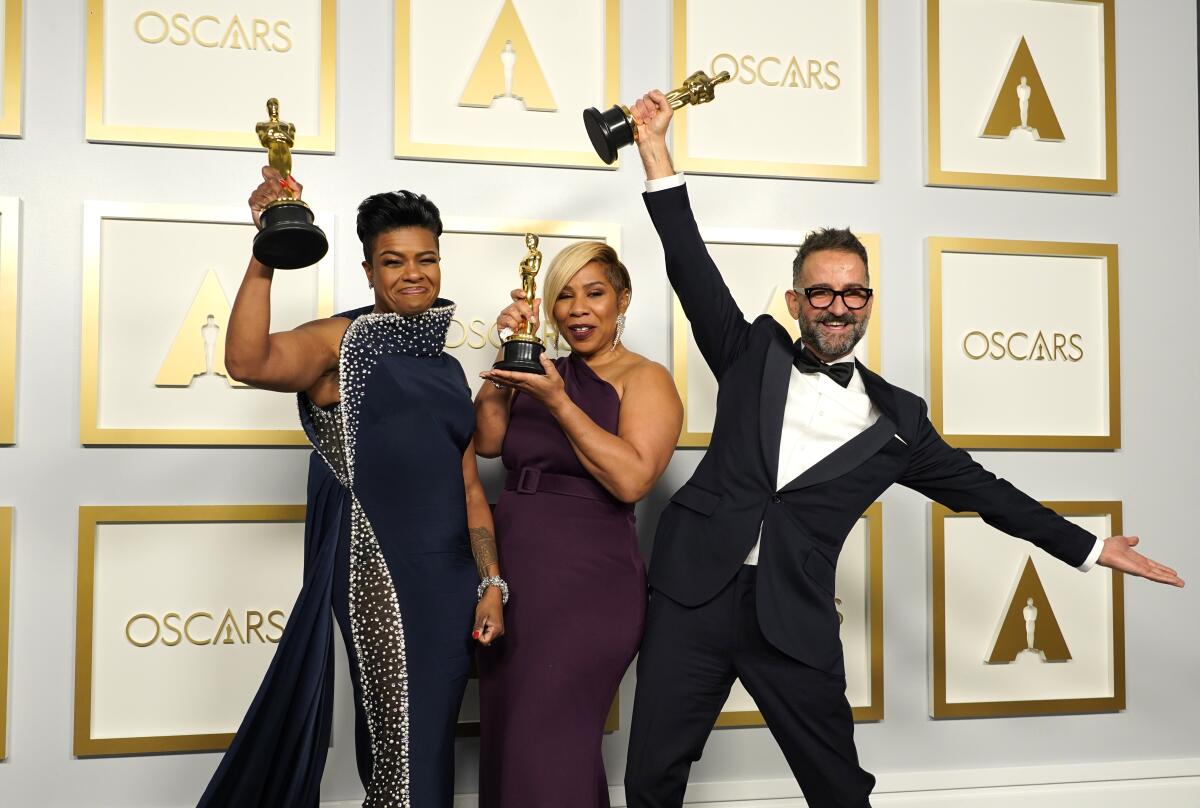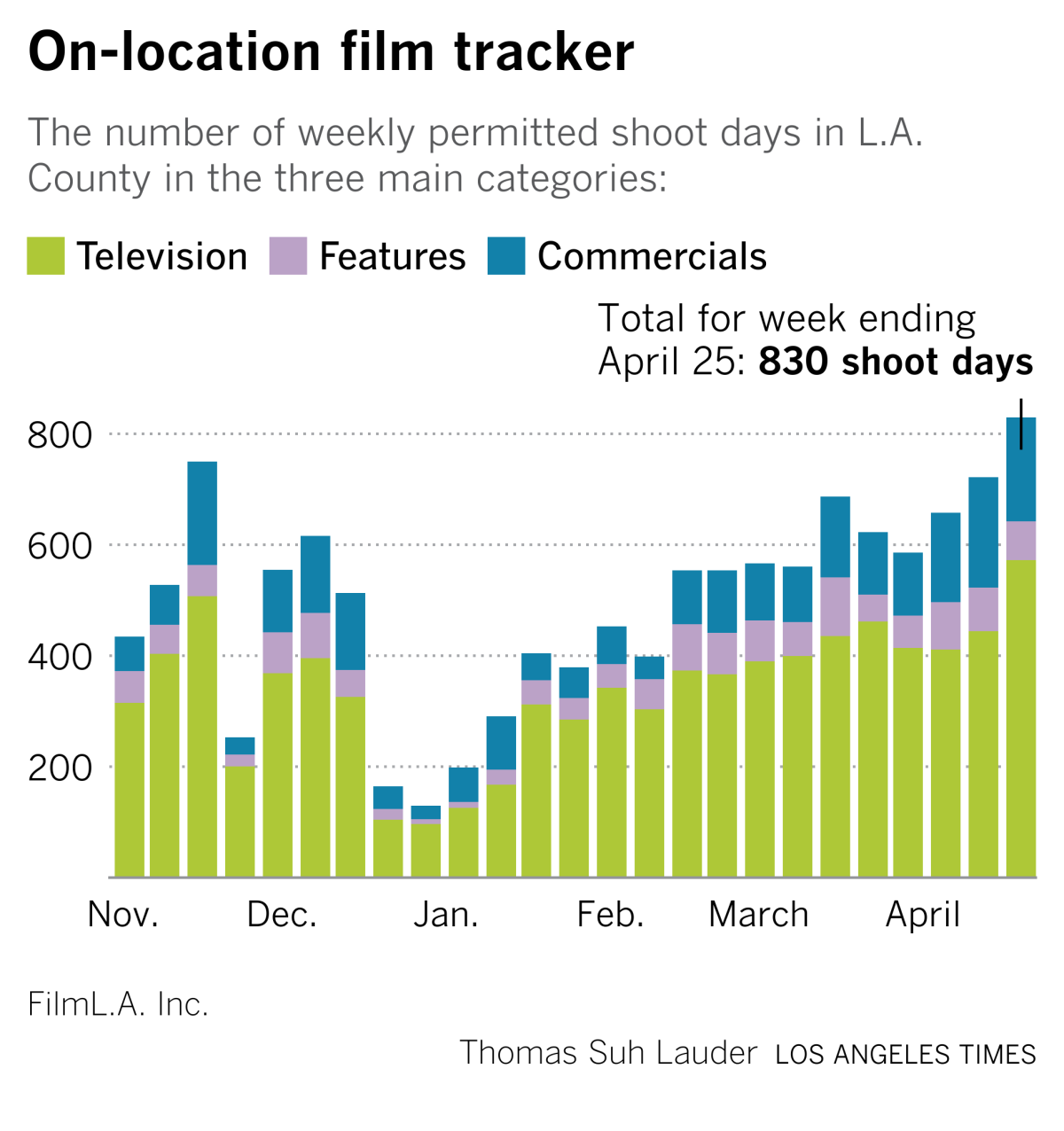Oscars 2021 snubbed movie theaters in an hour of need

This is the April 27, 2021, edition of The Wide Shot, a weekly newsletter about everything happening in the business of entertainment. Sign up here to get it in your inbox.
As the cinematic experience mounts a tenuous recovery more than a year into the pandemic, one might think that Hollywood’s brightest stars, basking in Oscar glory, would have taken the opportunity to call audiences back to film’s natural home: the big screen.
Alas, amid the litany of “thank yous” issued to various agents, studio executives and family members from Union Station and satellite locations Sunday night, America’s beleaguered movie houses were conspicuously snubbed.
Inside the business of entertainment
The Wide Shot brings you news, analysis and insights on everything from streaming wars to production — and what it all means for the future.
You may occasionally receive promotional content from the Los Angeles Times.
The notable exception, Frances McDormand, kicked off her speech celebrating “Nomadland’s” best picture win with an impassioned appeal for traditional moviegoing.
“Please watch our movie on the largest screen possible, and one day very, very soon, take everyone you know into a theater, shoulder to shoulder in that dark space and watch every film that’s represented here tonight,” she said, before howling like a wolf in tribute to a late crew member. Production sound mixer Michael Wolf Snyder recently died by suicide.
The broadcast, on Disney-owned ABC, did promote a handful of upcoming theatrical movies, including Steven Spielberg’s “West Side Story” (a Disney movie via the Fox acquisition) and Warner Bros.’ adaptation of Lin-Manuel Miranda’s “In the Heights.”
While the telecast was intended as a love letter to film, it was basically agnostic on where people ought to try to see the art being honored. Which is kind of the way the industry is going more broadly. Incidentally, “In the Heights” will be in theaters and on HBO Max at the same time when it’s released in June.
This from an industry where places like ArcLight and the Cinerama Dome in Hollywood, considered a temple for many filmmakers, have folded. ArcLight Cinemas and Pacific Theatres announced their permanent closure less than a month ago. A white knight has yet to emerge as a takeover candidate for the treasured locations. Additionally, Alamo Drafthouse’s bankruptcy auction was canceled Monday due to a lack of bidders, leaving the Austin chain in the hands of private equity firms.
At the same time, the box office is finally starting to show some life, with a true nail-biter race for first place between Warner’s “Mortal Kombat” and the anime “Demon Slayer” over the weekend.
Theaters did get a nod in the pre-show festivities.
Amid the red carpet interviews and original song performances, ABC aired a two-minute sizzle reel titled “The Big Screen Is Back,” introduced by Matthew McConaughey. Speaking from Austin, the actor paid tribute to the 150,000 U.S. theater workers (pre-pandemic) who were employed by the industry and suffered “basically the longest intermission they could’ve ever imagined.”
The video featured clips from upcoming possible blockbusters such as “Space Jam: A New Legacy,” “The Suicide Squad,” “Black Widow” and “F9,” interspersed with soundbites from theater workers, including a couple who met in a movie house and got married. “The movie theater is a treasure,” said one worker. “I wouldn’t trade it for anything.”
The P.S.A., coordinated with the studios and theater companies by talent agency CAA, is part of a longer marketing campaign to bring moviegoers back after a lost year in which streaming dominated the entertainment industry conversation.
Theater companies, including the biggest corporate players and the smaller regional chains, have long said their survival depends on the support of studios. Studios’ parent companies — the biggest of which are trying to grow their streaming services — may have other ideas. The broadcast itself, no surprise, featured ads for Disney+, Hulu and ESPN+.
Oscar ratings collapsed because of the lack of popular films and the broader waning interest in awards shows, as Stephen Battaglio reported.
Those who did watch got to see some historic achievements, including Chloé Zhao becoming the first woman of color to win for director. There were moments of levity, including a priceless reaction shot of Daniel Kaluuya’s mom after he thanked his parents for having sex and a bizarrely funny bit with Glenn Close doing some retro dancing to classic go-go band E.U.
Theaters, though, don’t need “Da Butt.” They need the butts in seats.
And the Oscar goes to...

Please check out our full coverage of the 93rd Academy Awards, including our review of the show itself (was it as cinematic as promised?) and that ending, which seemed like an epic miscalculation.
In Steven Soderbergh’s “Ocean’s Eleven,” the climactic heist depends on multiple factors happening just as they’re supposed to. The category switcharoo depended on one thing, in particular, going as expected: Chadwick Boseman’s posthumous Oscar. It didn’t.
Netflix had the most Oscars, with seven, though it’s worth pointing out that many of the awards were for technical achievements and shorts. The major awards were pretty spread out among the distributors, including Warner Bros., Sony Pictures Classics and A24. Disney ended the night with five trophies — three for Searchlight’s “Nomadland” and two for Pixar’s “Soul.”
Stuff we wrote
— A rising actor, fake HBO deals and one of Hollywood’s most audacious Ponzi schemes. Times reporter Michael Finnegan reports the tale of Zachary Horwitz, a low-level actor who collected $690 million from investors for movie deals authorities say were fictitious. Investors are now trying to recover $235 million that he never repaid.
— The race to succeed Alex Trebek as “Jeopardy” host is getting more crowded! LeVar Burton‘s fans are finally getting their wish as the actor has been tapped to guest host the game show before its current season ends.
— Will anyone watch 90-minute movies made by TikTok creators? Wendy Lee spoke to the leaders of a Culver City startup that is banking on it.
— TV is helping to boost the recovery in Hollywood production activity, according to data from FilmLA. TV productions such as “NCIS: Los Angeles” contributed 3,766 shoot days in the first quarter, up 50% from the same period last year, FilmLA said in a report Friday. Overall on-location filming in the quarter dropped 3% to 7,011 shoot days compared with a year ago, reflecting a pause in production in January. Also, the Greater Los Angeles area just had its biggest week since the start of COVID-19 shutdowns in March 2020.

Dude, where’s my movie?
Sony’s pact to send movies including upcoming “Spider-Man” and other Marvel films to Netflix after theatrical release and home video was seen as a big deal, helping to pad Netflix’s content library and guaranteeing a chunk of change for the Culver City movie studio.
Then it got more complicated. Sony last week did another deal with Disney to give the Burbank company’s outlets, including Disney+ and Hulu, the rights to its movies after their runs on Netflix. So “Spider-Man” is indeed coming home, at least eventually, though it’s not exactly clear which webslinger movies are going to what channels or when. The five-year Disney-Sony deal starts in 2022.
The streaming output deals essentially replace the traditional pay-1 and pay-2 windows studios have with television companies. A pay-1 deal is how Hollywood movies go to premium channels like HBO and Starz after they’re in theaters and on DVD. The first pay-TV window is usually 18 months long and reaps hundreds of millions of dollars a year for the studio in question.
While windowing for TV and streaming rights is normal practice for the industry, it’s become a source of frustration for consumers who don’t understand why a movie they saved to their Hulu or Netflix queue might be there one day and gone the next. This is a problem that streaming aggregators like JustWatch and Reelgood address by allowing users to search by title to see where the films are available to stream on subscription and ad-based services, as well as on VOD.
Reelgood illustrates the issue with a dizzying chart showing all the places “Batman Begins” and “The Dark Knight” have been available for streaming during the last year or so.
By the way, both titles are currently on Netflix and HBO Max, and they leave Netflix at the end of the month.
Number of the week

A series of new movies going directly to HBO Max — including Zack Snyder’s monster cut of “Justice League” — helped AT&T add 2.7 million subscribers to HBO Max during the first quarter, as my colleague Meg James wrote.
It’s definitely progress. But is it a lot?
It may not look like much when compared to the 3.98 million members Netflix added in its most recent quarter, considered a disappointment and a sign that the company’s pandemic-fueled growth is slowing. But the Netflix numbers are global and its growth now mostly comes from outside the U.S. and Canada. HBO Max only operates in the U.S. so far. HBO Max and HBO count a combined 44.2 million domestic subscribers, compared to 41.5 million at the end of December.
AT&T said HBO Max by itself now has about 40.6 million subscribers, but remember that 30.9 million of those are “wholesale” subscribers. Those are customers who subscribe to HBO through cable bundles (like AT&T’s) that were automatically converted to HBO Max eligibility, and the tally counts people who may not have signed into the new service.
The phone company counts 9.69 million “retail” HBO Max subs — people billed directly by WarnerMedia or who pay for the app through a third party.
The other factor is what WarnerMedia had to do to get to that number. The company took its theatrical movies like “Tom & Jerry” and “Godzilla vs. Kong” and released them on its service at the same time as in cinemas. It also unleashed the new four-hour version of “Justice League.” The day-and-date plan seems to be doing its job, though maybe not enough to justify continuing it after COVID-19 subsides.
More stories from the web
— After a series of investigations of producer Scott Rudin’s bullying behavior in the Hollywood Reporter, Vulture and the New York Times, Hollywood’s response has been relatively muted. I highly recommend the New York Times piece that ran Saturday, which takes a more expansive view of his treatment of employees and others in the industry.
— Shudder, the horror streaming service, knows what you’ll stream this summer, writes Josef Adalian of the niche player owned by AMC Networks. (Vulture)
— Malcolm Gladwell’s company, like many consumers, is going audiobook first, using sound effects and original music. “We think with our eyes and feel with our ears,” he says. (WSJ)
— Ex-staff decry “heartbreaking” treatment at Abigail Disney’s Level Forward, a studio and Broadway production company created in the aftermath of the Harvey Weinstein allegations. The heiress responded: “We own the ways in which we’ve messed up.” (THR)
Finally... ‘slow’ news day
Slate’s “Slow Burn” podcast is back, with a new season focused on the lead-up to the Iraq war.
Also, I’m enjoying the music of British post-punks Dry Cleaning, which reminds me of some of Sonic Youth’s more accessible work. Here’s the video for “Scratchcard Lanyard.”
Inside the business of entertainment
The Wide Shot brings you news, analysis and insights on everything from streaming wars to production — and what it all means for the future.
You may occasionally receive promotional content from the Los Angeles Times.




